AR
-
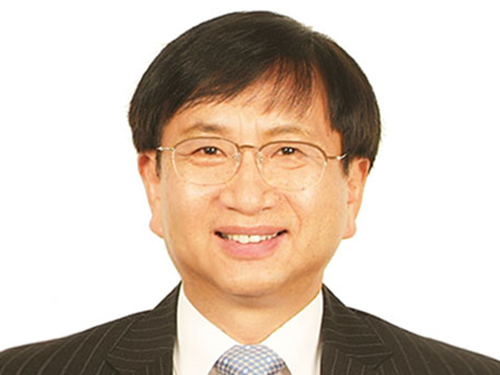 Professor Kwon to Represent the Asia-Pacific Region of the IEEE RAS
Professor Dong-Soon Kwon of the Mechanical Engineering Department at KAIST has been reappointed to the Administrative Committee of the Institute of Electrical and Electronics Engineers (IEEE) Robotics and Automation Society (IEEE RAS). Beginning January 1, 2017, he will serve his second three-year term, which will end in 2019. In 2014, he was the first Korean appointed to the committee, representing the Asia-Pacific community of the IEEE Society.
Professor Kwon said, “I feel thankful but, at the same time, it is a great responsibility to serve the Asian research community within the Society. I hope I can contribute to the development of robotics engineering in the region and in Korea as well.”
Consisted of 18 elected members, the administrative committee manages the major activities of IEEE RAS including hosting its annual flagship meeting, the International Conference on Robotics and Automation.
The IEEE RAS fosters the advancement in the theory and practice of robotics and automation engineering and facilitates the exchange of scientific and technological knowledge that supports the maintenance of high professional standards among its members.
2016.12.06 View 12649
Professor Kwon to Represent the Asia-Pacific Region of the IEEE RAS
Professor Dong-Soon Kwon of the Mechanical Engineering Department at KAIST has been reappointed to the Administrative Committee of the Institute of Electrical and Electronics Engineers (IEEE) Robotics and Automation Society (IEEE RAS). Beginning January 1, 2017, he will serve his second three-year term, which will end in 2019. In 2014, he was the first Korean appointed to the committee, representing the Asia-Pacific community of the IEEE Society.
Professor Kwon said, “I feel thankful but, at the same time, it is a great responsibility to serve the Asian research community within the Society. I hope I can contribute to the development of robotics engineering in the region and in Korea as well.”
Consisted of 18 elected members, the administrative committee manages the major activities of IEEE RAS including hosting its annual flagship meeting, the International Conference on Robotics and Automation.
The IEEE RAS fosters the advancement in the theory and practice of robotics and automation engineering and facilitates the exchange of scientific and technological knowledge that supports the maintenance of high professional standards among its members.
2016.12.06 View 12649 -
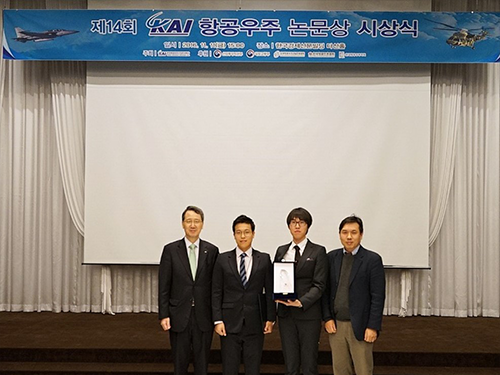 Aerospace Engineering Students Win the Minister's Award
On November 11, 2016, students from KAIST’s Aerospace Engineering Department won the Minister’s Award of Trade, Industry and Energy of Korea at the 14th Research Paper Competition hosted by Korea Aerospace Industries (KAI). The award came with a cash prize of USD 1,200 as well as opportunities to visit international airshows held abroad.
The KAIST students' paper introduced a novel design concept for "a virtual-fighter-pilot system for unmanned combat aerial vehicles to enable them to engage in mass aerial combat."
This was one of the two highest honors given to contestants. A group of students from Korea Aerospace University received the other grand prize from the Minister of Land, Infrastructure and Transport of Korea.
The KAIST team consisted of two doctoral students, Hee-Min Shin and Jae-Hyun Lee, and one Master’s student, Hyun-Gi Kim. Their advisor, Professor “David” Hyunchul Shim, received the Special Achievement Award for his contribution to the paper.
KAI’s competition was established in 2003 to spur academic interest and research in aerospace engineering. Over the past 14 years, contestants have submitted 376 papers, and KAI has published 88 papers. KAI has positioned itself as the host of one of the most prestigious research paper competitions held in Korea in the area of aerospace engineering.
The Korean Society for Aeronautical and Space Sciences, the Korea Aerospace Industries Association, and the Korea Civil Aviation Development Association also sponsored the competition, with the Ministries of Trade, Industry and Energy and of Land, Infrastructure and Transport.
Professor Shim said, “This represents a great honor for our students. In recent years, research in unmanned aerial systems has increased tremendously throughout the world, and I hope KAIST will continue to inspire and innovate research in this field.”
Pictured from left to right are Hee-Min Shin, Jae-Hyun Lee, and Hyun-Gi Kim.
Pictured from right to left are Professor Hyunchul Shim, Hyun-Gi Kim, Hee-Min Shin, and Vice President Sung-Sup Chang of Korea Aerospace Industries.
2016.11.22 View 14208
Aerospace Engineering Students Win the Minister's Award
On November 11, 2016, students from KAIST’s Aerospace Engineering Department won the Minister’s Award of Trade, Industry and Energy of Korea at the 14th Research Paper Competition hosted by Korea Aerospace Industries (KAI). The award came with a cash prize of USD 1,200 as well as opportunities to visit international airshows held abroad.
The KAIST students' paper introduced a novel design concept for "a virtual-fighter-pilot system for unmanned combat aerial vehicles to enable them to engage in mass aerial combat."
This was one of the two highest honors given to contestants. A group of students from Korea Aerospace University received the other grand prize from the Minister of Land, Infrastructure and Transport of Korea.
The KAIST team consisted of two doctoral students, Hee-Min Shin and Jae-Hyun Lee, and one Master’s student, Hyun-Gi Kim. Their advisor, Professor “David” Hyunchul Shim, received the Special Achievement Award for his contribution to the paper.
KAI’s competition was established in 2003 to spur academic interest and research in aerospace engineering. Over the past 14 years, contestants have submitted 376 papers, and KAI has published 88 papers. KAI has positioned itself as the host of one of the most prestigious research paper competitions held in Korea in the area of aerospace engineering.
The Korean Society for Aeronautical and Space Sciences, the Korea Aerospace Industries Association, and the Korea Civil Aviation Development Association also sponsored the competition, with the Ministries of Trade, Industry and Energy and of Land, Infrastructure and Transport.
Professor Shim said, “This represents a great honor for our students. In recent years, research in unmanned aerial systems has increased tremendously throughout the world, and I hope KAIST will continue to inspire and innovate research in this field.”
Pictured from left to right are Hee-Min Shin, Jae-Hyun Lee, and Hyun-Gi Kim.
Pictured from right to left are Professor Hyunchul Shim, Hyun-Gi Kim, Hee-Min Shin, and Vice President Sung-Sup Chang of Korea Aerospace Industries.
2016.11.22 View 14208 -
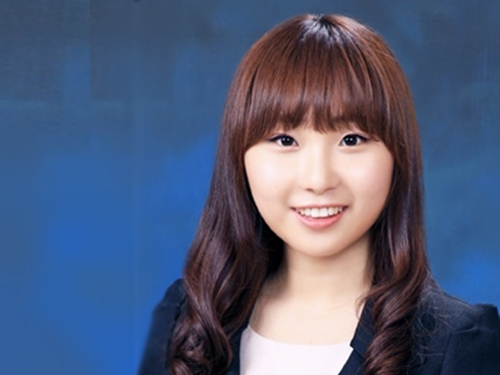 KAIST's Doctoral Student Receives a Hoffman Scholarship Award
Hyo-Sun Lee, a doctoral student at the Graduate School of EEWS (Environment, Energy, Water and Sustainability), KAIST, is a recipient of the 2016 Dorothy M. and Earl S. Hoffman Scholarships presented by the American Vacuum Society (AVS). The award ceremony took place during the Society’s 63rd International Symposium and Exhibition on November 6-11, 2016 in Nashville, Tennessee.
Lee is the first Korean and foreign student to receive this scholarship.
The Hoffman Scholarships were established in 2002 to recognize and encourage excellence in graduate studies in the sciences and technologies of interest to AVS. The scholarships are funded by a bequest from Dorothy M. Hoffman, who was a pioneering member of the Society of Women Engineers and served as the president of AVS in 1974.
Lee received the scholarship for her research that detects hot electrons from chemical reactions on catalytic surface using nanodevices. Nano Letters, an academic journal published by the American Chemical Society, described her work in its February 2016 issue as a technology that allows quantitative analysis of hot electrons by employing a new nanodevice and therefore helps researchers understand better the mechanism of chemical reactions on nanocatalytic surface. She also published her work to detect the flow of hot electrons that occur on metal nanocatalytic surface during hydrogen oxidation reactions in Angewandte Chemie.
Lee said, “I am pleased to receive this honor from such a world-renowned academic society. Certainly, this will be a great support for my future study and research.”
Founded in 1953, AVS is an interdisciplinary, professional society composed of approximately 4,500 members worldwide. It supports networking among academic, industrial, government, and consulting professionals involved in a range of established and emerging science and technology areas such as chemistry, physics, engineering, business, and technology development.
2016.11.17 View 12058
KAIST's Doctoral Student Receives a Hoffman Scholarship Award
Hyo-Sun Lee, a doctoral student at the Graduate School of EEWS (Environment, Energy, Water and Sustainability), KAIST, is a recipient of the 2016 Dorothy M. and Earl S. Hoffman Scholarships presented by the American Vacuum Society (AVS). The award ceremony took place during the Society’s 63rd International Symposium and Exhibition on November 6-11, 2016 in Nashville, Tennessee.
Lee is the first Korean and foreign student to receive this scholarship.
The Hoffman Scholarships were established in 2002 to recognize and encourage excellence in graduate studies in the sciences and technologies of interest to AVS. The scholarships are funded by a bequest from Dorothy M. Hoffman, who was a pioneering member of the Society of Women Engineers and served as the president of AVS in 1974.
Lee received the scholarship for her research that detects hot electrons from chemical reactions on catalytic surface using nanodevices. Nano Letters, an academic journal published by the American Chemical Society, described her work in its February 2016 issue as a technology that allows quantitative analysis of hot electrons by employing a new nanodevice and therefore helps researchers understand better the mechanism of chemical reactions on nanocatalytic surface. She also published her work to detect the flow of hot electrons that occur on metal nanocatalytic surface during hydrogen oxidation reactions in Angewandte Chemie.
Lee said, “I am pleased to receive this honor from such a world-renowned academic society. Certainly, this will be a great support for my future study and research.”
Founded in 1953, AVS is an interdisciplinary, professional society composed of approximately 4,500 members worldwide. It supports networking among academic, industrial, government, and consulting professionals involved in a range of established and emerging science and technology areas such as chemistry, physics, engineering, business, and technology development.
2016.11.17 View 12058 -
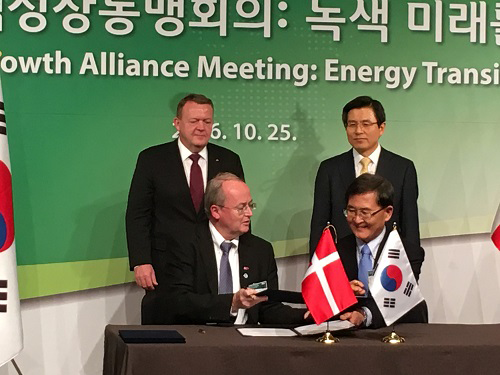 MOU between KAIST and DTU Signed
KAIST and the Technical University of Denmark (DTU) signed a memorandum of understanding (MOU) to cooperate in the areas of startup, student exchange, and joint research on October 25, 2016 at the Embassy of Denmark in Seoul, Korea. Under the agreement, KAIST and DTU will exchange students and researchers through startup programs and continue to collaborating in education and research.
The MOU was facilitated during the Green Growth Alliance Meeting and Energy Seminar hosted by the Danish embassy, in which Danish Prime Minister Lars Løkke Rasmussen participated.
President Steve Kang of KAIST, who fostered the agreement, said,
“DTU has been one of our strategic partners in Europe. We have been working closely with them on academic exchanges and research collaborations, but now with the expansion of our cooperation into entrepreneurship, we will create momentum to spur startups in both schools. To support such activities, we will use KAIST’s experiences acquired from operating the K-School, an entrepreneurship graduate school, and the Institute of KAIST Entrepreneurship. DTU will also share their knowledge on startup programs including SkyLab and StartDTU. I believe this will become another successful alliance between the two universities.”
As of October 2016, KAIST has made 18 agreements with DTU, exchanging 120 students in the past three years and implementing various joint seminars and conferences for academic and research exchanges.
Established in 1829, DTU has been a leading science and technology university in Denmark. It ranked 109 in the QS World University Rankings 2016 and 46th in its subject rankings in engineering and technology.
In the picture below, President Steve Kang of KAIST (right) and Senior Vice President Martin P. Bendsøe of the Technical University of Denmark (left) are signing an agreement for academic and research cooperation.
2016.10.27 View 8935
MOU between KAIST and DTU Signed
KAIST and the Technical University of Denmark (DTU) signed a memorandum of understanding (MOU) to cooperate in the areas of startup, student exchange, and joint research on October 25, 2016 at the Embassy of Denmark in Seoul, Korea. Under the agreement, KAIST and DTU will exchange students and researchers through startup programs and continue to collaborating in education and research.
The MOU was facilitated during the Green Growth Alliance Meeting and Energy Seminar hosted by the Danish embassy, in which Danish Prime Minister Lars Løkke Rasmussen participated.
President Steve Kang of KAIST, who fostered the agreement, said,
“DTU has been one of our strategic partners in Europe. We have been working closely with them on academic exchanges and research collaborations, but now with the expansion of our cooperation into entrepreneurship, we will create momentum to spur startups in both schools. To support such activities, we will use KAIST’s experiences acquired from operating the K-School, an entrepreneurship graduate school, and the Institute of KAIST Entrepreneurship. DTU will also share their knowledge on startup programs including SkyLab and StartDTU. I believe this will become another successful alliance between the two universities.”
As of October 2016, KAIST has made 18 agreements with DTU, exchanging 120 students in the past three years and implementing various joint seminars and conferences for academic and research exchanges.
Established in 1829, DTU has been a leading science and technology university in Denmark. It ranked 109 in the QS World University Rankings 2016 and 46th in its subject rankings in engineering and technology.
In the picture below, President Steve Kang of KAIST (right) and Senior Vice President Martin P. Bendsøe of the Technical University of Denmark (left) are signing an agreement for academic and research cooperation.
2016.10.27 View 8935 -
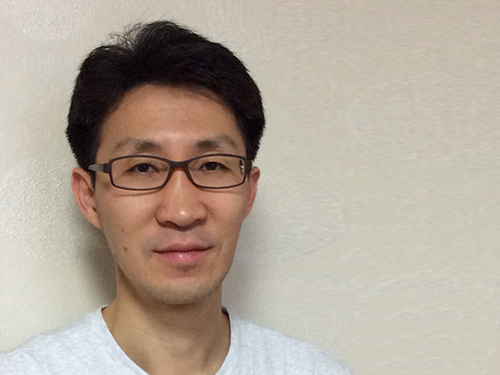 Professor Shin's Team Receives the Best Software Defined Network Solution Showcase Award
Professor Seungwon Shin of the Electrical Engineering School at KAIST and his research team won the Best Software Defined Networking (SDN) Solution Showcase Award hosted by the SDN World Congress, one of the biggest network summits held in Europe with over 2,000 participants. This year the conference took place in The Hague, the Netherlands, October 10-14, 2016.
SDN is an approach to computer networking that allows network administrators to respond quickly to changing business requirements via a centralized control console and to support the dynamic, scalable computing and storage needs of more modern computing environments such as data centers.
Collaborating with researchers from Queen’s University in the United Kingdom and Huawei, a global information and communications technology solutions provider in China, Professor Shin’s team, which is led by doctoral students Seungsoo Lee, Changhoon Yoon, and Jaehyun Nam, implemented a SDN security project called “DELTA.” ATTORESEARCH, a Korean SDN architecture and applications provider, conducted testing and verification for the project.
DELTA is a new SDN security evaluation framework with two main functions. It can automatically recognize attack cases against SDN elements across diverse environments and can assist in identifying unknown security problems within a SDN deployment.
The DELTA project consists of a control plane, the part of a network that carries signaling traffic and is responsible for routing; a data plane, the part of a network that carries user traffic; and a control channel that connects the two aforementioned planes. These three components have their own agents installed, which are all controlled by an agent manger. The agent manger can automatically detect any spots where the network security is weak.
Specifically, the project aimes to defense attacks against OpenFlow protocol, one of the first SDN standards; SDN controllers, a network operating system that is based on protocols; and network switch devices that use OpenFlow protocol.
The DELTA project was registered with the Open Networking Foundation, a user-driven organization dedicated to the promotion and adoption of SDN through open standards development, as an open source SDN security evaluation tool. This project is the only open source SDN which has been led by Korean researchers.
The SDN World Congress 2016 recognized the need for and importance of the DELTA project by conferring upon it the Best Solution Showcase Award. The Open Networking Foundation also widely publicized this award news.
Professor Shin said:
“In recent years, SDN has been attracting a large amount of interest as an emerging technology, but there still have not many SDN projects in Korea. This award acknowledges the advancement of Korean SDN technology, showing the potential for Korea to become a leader in SDN research.”
Picture: Major Components of the DELTA Project: Agents and Agent Manger
2016.10.25 View 10513
Professor Shin's Team Receives the Best Software Defined Network Solution Showcase Award
Professor Seungwon Shin of the Electrical Engineering School at KAIST and his research team won the Best Software Defined Networking (SDN) Solution Showcase Award hosted by the SDN World Congress, one of the biggest network summits held in Europe with over 2,000 participants. This year the conference took place in The Hague, the Netherlands, October 10-14, 2016.
SDN is an approach to computer networking that allows network administrators to respond quickly to changing business requirements via a centralized control console and to support the dynamic, scalable computing and storage needs of more modern computing environments such as data centers.
Collaborating with researchers from Queen’s University in the United Kingdom and Huawei, a global information and communications technology solutions provider in China, Professor Shin’s team, which is led by doctoral students Seungsoo Lee, Changhoon Yoon, and Jaehyun Nam, implemented a SDN security project called “DELTA.” ATTORESEARCH, a Korean SDN architecture and applications provider, conducted testing and verification for the project.
DELTA is a new SDN security evaluation framework with two main functions. It can automatically recognize attack cases against SDN elements across diverse environments and can assist in identifying unknown security problems within a SDN deployment.
The DELTA project consists of a control plane, the part of a network that carries signaling traffic and is responsible for routing; a data plane, the part of a network that carries user traffic; and a control channel that connects the two aforementioned planes. These three components have their own agents installed, which are all controlled by an agent manger. The agent manger can automatically detect any spots where the network security is weak.
Specifically, the project aimes to defense attacks against OpenFlow protocol, one of the first SDN standards; SDN controllers, a network operating system that is based on protocols; and network switch devices that use OpenFlow protocol.
The DELTA project was registered with the Open Networking Foundation, a user-driven organization dedicated to the promotion and adoption of SDN through open standards development, as an open source SDN security evaluation tool. This project is the only open source SDN which has been led by Korean researchers.
The SDN World Congress 2016 recognized the need for and importance of the DELTA project by conferring upon it the Best Solution Showcase Award. The Open Networking Foundation also widely publicized this award news.
Professor Shin said:
“In recent years, SDN has been attracting a large amount of interest as an emerging technology, but there still have not many SDN projects in Korea. This award acknowledges the advancement of Korean SDN technology, showing the potential for Korea to become a leader in SDN research.”
Picture: Major Components of the DELTA Project: Agents and Agent Manger
2016.10.25 View 10513 -
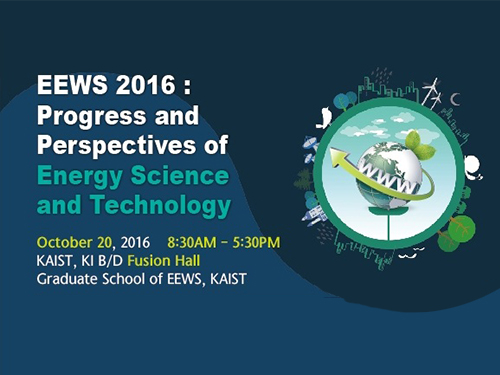 2016 KAIST EEWS Workshop
The Energy, Environment, Water and Sustainability (EEWS) Graduate School of KAIST hosted a workshop entitled “Progress and Perspectives of Energy Science and Technology” on October 20, 2016. The workshop took place at the Fusion Hall of the KAIST Institute on campus.
About 400 experts in energy science and engineering participated in the event. Eight globally recognized scientists introduced the latest research trends in nanomaterials, energy theory, catalysts, and photocatalysts and led discussions on the current status and prospects of EEWS.
Professors Yi Cui of Stanford University, an expert in nanomaterials, and William A. Goddard of California Institute of Technology presented their research experiments on materials design and recent results on the direction of theory under the topics of energy and environment.
Dr. Miquel Salmeron, a former head of the Material Science Division of Lawrence Berkeley National Laboratory, and Professor Yuichi Ikuhara of Tokyo University introduced their analysis of catalysts and energy matters at an atomic scale.
Professor Sukbok Chang of the Chemistry Department at KAIST, a deputy editor of ACS Catalysis and the head of the Center for Catalytic Hydrocarbon Functionalizations at the Institute of Basic Science, and Professor Yang-Kook Sun of Energy Engineering at Hanyang University, who is also a deputy editor of ACS Energy Letters, presented their latest research results on new catalytic reaction development and energy storage.
The workshop consisted of three sections which addressed the design of energy and environment materials; analysis of energy and catalytic materials; and energy conversion and catalysts.
The EEWS Graduate School was established in 2008 with the sponsorship of the Korean government’s World Class University (WCU) project to support science education in Korea. Professor J. Fraser Stoddart, the winner of the 2016 Nobel Prize in Chemistry, was previously worked at the KAIST EEWS Graduate School as a WCU visiting professor for two years, from 2011 to 2013. Professor Ali Coskun, who was a postdoctoral researcher in the laboratory of Professor Stoddart, now teaches and conducts research as a full-time professor at the graduate school.
Dean Yousung Jung of the EEWS Graduate School said:
“This workshop has provided us with a meaningful opportunity to engage in discussions on energy science and technology with world-class scholars from all around the world. It is also a good venue for our graduate school to share with them what we have been doing in research and education.”
2016.10.20 View 15434
2016 KAIST EEWS Workshop
The Energy, Environment, Water and Sustainability (EEWS) Graduate School of KAIST hosted a workshop entitled “Progress and Perspectives of Energy Science and Technology” on October 20, 2016. The workshop took place at the Fusion Hall of the KAIST Institute on campus.
About 400 experts in energy science and engineering participated in the event. Eight globally recognized scientists introduced the latest research trends in nanomaterials, energy theory, catalysts, and photocatalysts and led discussions on the current status and prospects of EEWS.
Professors Yi Cui of Stanford University, an expert in nanomaterials, and William A. Goddard of California Institute of Technology presented their research experiments on materials design and recent results on the direction of theory under the topics of energy and environment.
Dr. Miquel Salmeron, a former head of the Material Science Division of Lawrence Berkeley National Laboratory, and Professor Yuichi Ikuhara of Tokyo University introduced their analysis of catalysts and energy matters at an atomic scale.
Professor Sukbok Chang of the Chemistry Department at KAIST, a deputy editor of ACS Catalysis and the head of the Center for Catalytic Hydrocarbon Functionalizations at the Institute of Basic Science, and Professor Yang-Kook Sun of Energy Engineering at Hanyang University, who is also a deputy editor of ACS Energy Letters, presented their latest research results on new catalytic reaction development and energy storage.
The workshop consisted of three sections which addressed the design of energy and environment materials; analysis of energy and catalytic materials; and energy conversion and catalysts.
The EEWS Graduate School was established in 2008 with the sponsorship of the Korean government’s World Class University (WCU) project to support science education in Korea. Professor J. Fraser Stoddart, the winner of the 2016 Nobel Prize in Chemistry, was previously worked at the KAIST EEWS Graduate School as a WCU visiting professor for two years, from 2011 to 2013. Professor Ali Coskun, who was a postdoctoral researcher in the laboratory of Professor Stoddart, now teaches and conducts research as a full-time professor at the graduate school.
Dean Yousung Jung of the EEWS Graduate School said:
“This workshop has provided us with a meaningful opportunity to engage in discussions on energy science and technology with world-class scholars from all around the world. It is also a good venue for our graduate school to share with them what we have been doing in research and education.”
2016.10.20 View 15434 -
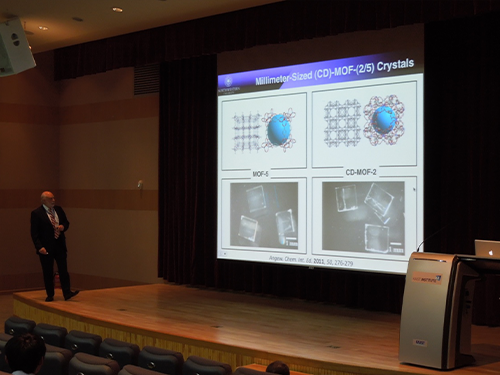 J. Fraser Stoddart, a Former Visiting Professor at KAIST, Wins the 2016 Nobel Prize in Chemistry
J. Fraser Stoddart, who is Northwestern University’s Board of Trustees Professor of Chemistry and head of the Stoddart Mechanostereochemistry Group, received the 2016 Nobel Prize in Chemistry. He shares it with Professor Jean-Pierre Sauvage of the University of Strasbourg in France and Professor Bernard Feringa of the University of Groningen in the Netherlands.
Professor Stoddart’s relationship with KAIST dates to his term as a visiting professor from 2011 to 2013 at the Environment, Energy, Water and Sustainability (EEWS) Graduate School. The Nobel Committee awarded the prize to Professor Stoddart in recognition of his pioneering work on artificial molecular machines, a.k.a., nanomachines.
A molecular machine is an assembly of a discrete number of molecular components designed to perform machine-like movements as the result of appropriate external stimuli. Like their counterparts in the macroscopic world, molecular machines control mechanical movements and rotations in response to an energy input such as chemical reactions, light, or temperature. The most complex molecular machines, for example, are proteins in cells. Chemists have attempted to imitate these structures for potential applications including smart nanomedicines to track diseases such as cancer cells and deliver drugs to fight them. Other applications include next-generation miniature semiconductor chips, sensors, energy storage, space exploration, and armaments.
In 1991, Professor Stoddart developed artificial molecular machines based on a rotaxane. A rotaxane is a mechanically-interlocked molecular architecture in which a dumbbell-shaped molecule is encircled by a molecular ring called a macrocycle. He presented important research on the production of rotaxanes and demonstrated that a macrocycle could move along or rotate freely around the axle, a dumbbell-shaped molecule.
Professor Stoddart is also an expert in molecular electronics using molecules on the nanoscale as switches in computers and other electronic devices. In 2007, he created a large-scale ultra-dense memory device with reconfigurable molecular switches, the size of white blood cells but capable of storing information. This was a significant achievement towards the development of molecular computers that are much smaller and more powerful compared to today’s silicon-based computers.
KAIST has enjoyed a strong relationship with Professor Stoddart since he served as a visiting professor at the EEWS Graduate School from 2011 to 2013. The graduate school invited him to participate in the Korean government’s science and education program to foster world-class universities in the nation. At KAIST, he taught a course entitled “Nanomachines at the Scale of Molecules.” He also collaborated with Korean researchers on various projects including the publication of a joint research paper, “A Radically Configurable Six-State Compound,” in Science (January 25, 2013) with Professor Jang Wook Choi from the EEWS Graduate School and researchers from the United States, the United Kingdom, and Saudi Arabia.
Two doctors with KAIST ties have links to Professor Stoddart as well. In 2012, Dr. Ali Coskun, who worked with him as a postdoctoral research associate at Northwestern University, became an associate professor at the EEWS Graduate School where he conducts research on secondary batteries and gas storage with artificial molecular machines. Dr. Dong Jun Kim, a KAIST graduate, has been working at the Stoddart Mechanostereochemistry Group as a postdoctoral fellow since 2015.
Picture 1: Synthesis of a Rotaxane Described in the Journal of the American Chemical Society (JACS) in 1991
Picture 2: Professor J. Fraser Stoddart Giving a Presentation at a Workshop Hosted by the EEWS Graduate School at KAIST in 2011
2016.10.13 View 9499
J. Fraser Stoddart, a Former Visiting Professor at KAIST, Wins the 2016 Nobel Prize in Chemistry
J. Fraser Stoddart, who is Northwestern University’s Board of Trustees Professor of Chemistry and head of the Stoddart Mechanostereochemistry Group, received the 2016 Nobel Prize in Chemistry. He shares it with Professor Jean-Pierre Sauvage of the University of Strasbourg in France and Professor Bernard Feringa of the University of Groningen in the Netherlands.
Professor Stoddart’s relationship with KAIST dates to his term as a visiting professor from 2011 to 2013 at the Environment, Energy, Water and Sustainability (EEWS) Graduate School. The Nobel Committee awarded the prize to Professor Stoddart in recognition of his pioneering work on artificial molecular machines, a.k.a., nanomachines.
A molecular machine is an assembly of a discrete number of molecular components designed to perform machine-like movements as the result of appropriate external stimuli. Like their counterparts in the macroscopic world, molecular machines control mechanical movements and rotations in response to an energy input such as chemical reactions, light, or temperature. The most complex molecular machines, for example, are proteins in cells. Chemists have attempted to imitate these structures for potential applications including smart nanomedicines to track diseases such as cancer cells and deliver drugs to fight them. Other applications include next-generation miniature semiconductor chips, sensors, energy storage, space exploration, and armaments.
In 1991, Professor Stoddart developed artificial molecular machines based on a rotaxane. A rotaxane is a mechanically-interlocked molecular architecture in which a dumbbell-shaped molecule is encircled by a molecular ring called a macrocycle. He presented important research on the production of rotaxanes and demonstrated that a macrocycle could move along or rotate freely around the axle, a dumbbell-shaped molecule.
Professor Stoddart is also an expert in molecular electronics using molecules on the nanoscale as switches in computers and other electronic devices. In 2007, he created a large-scale ultra-dense memory device with reconfigurable molecular switches, the size of white blood cells but capable of storing information. This was a significant achievement towards the development of molecular computers that are much smaller and more powerful compared to today’s silicon-based computers.
KAIST has enjoyed a strong relationship with Professor Stoddart since he served as a visiting professor at the EEWS Graduate School from 2011 to 2013. The graduate school invited him to participate in the Korean government’s science and education program to foster world-class universities in the nation. At KAIST, he taught a course entitled “Nanomachines at the Scale of Molecules.” He also collaborated with Korean researchers on various projects including the publication of a joint research paper, “A Radically Configurable Six-State Compound,” in Science (January 25, 2013) with Professor Jang Wook Choi from the EEWS Graduate School and researchers from the United States, the United Kingdom, and Saudi Arabia.
Two doctors with KAIST ties have links to Professor Stoddart as well. In 2012, Dr. Ali Coskun, who worked with him as a postdoctoral research associate at Northwestern University, became an associate professor at the EEWS Graduate School where he conducts research on secondary batteries and gas storage with artificial molecular machines. Dr. Dong Jun Kim, a KAIST graduate, has been working at the Stoddart Mechanostereochemistry Group as a postdoctoral fellow since 2015.
Picture 1: Synthesis of a Rotaxane Described in the Journal of the American Chemical Society (JACS) in 1991
Picture 2: Professor J. Fraser Stoddart Giving a Presentation at a Workshop Hosted by the EEWS Graduate School at KAIST in 2011
2016.10.13 View 9499 -
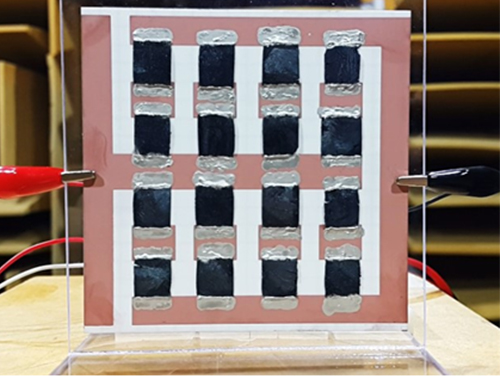 Extremely Thin and Highly Flexible Graphene-Based Thermoacoustic Speakers
A joint research team led by Professors Jung-Woo Choi and Byung Jin Cho of the School of Electrical Engineering and Professor Sang Ouk Kim of the Material Science and Engineering Department, all on the faculty of the Korea Advanced Institute of Science and Technology (KAIST), has developed a simpler way to mass-produce ultra-thin graphene thermosacoustic speakers.
Their research results were published online on August 17, 2016 in a journal called Applied Materials & Interfaces. The IEEE Spectrum, a monthly magazine published by the Institute of Electrical and Electronics Engineers, reported on the research on September 9, 2016, in an article titled, “Graphene Enables Flat Speakers for Mobile Audio Systems.” The American Chemical Society also drew attention to the team’s work in its article dated September 7, 2016, “Bringing Graphene Speakers to the Mobile Market.”
Thermoacoustic speakers generate sound waves from temperature fluctuations by rapidly heating and cooling conducting materials. Unlike conventional voice-coil speakers, thermoacoustic speakers do not rely on vibrations to produce sound, and thus do not need bulky acoustic boxes to keep complicated mechanical parts for sound production. They also generate good quality sound in all directions, enabling them to be placed on any surface including curved ones without canceling out sounds generated from opposite sides.
Based on a two-step, template-free fabrication method that involved freeze-drying a solution of graphene oxide flakes and the reduction/doping of oxidized graphene to improve electrical properties, the research team produced a N-doped, three-dimensional (3D), reduced graphene oxide aerogel (N-rGOA) with a porous macroscopic structure that permitted easy modulation for many potential applications.
Using 3D graphene aerogels, the team succeeded in fabricating an array of loudspeakers that were able to withstand over 40 W input power and that showed excellent sound pressure level (SPL), comparable to those of previously reported 2D and 3D graphene loudspeakers.
Choong Sun Kim, the lead author of the research paper and a doctoral student in the School of Electrical Engineering at KAIST, said:
“Thermoacoustic speakers have a higher efficiency when conducting materials have a smaller heat capacity. Nanomaterials such as graphene are an ideal candidate for conductors, but they require a substrate to support their extremely thinness. The substrate’s tendency to lose heat lowers the speakers’ efficiency. Here, we developed 3D graphene aerogels without a substrate by using a simple two-step process. With graphene aerogels, we have fabricated an array of loudspeakers that demonstrated stable performance. This is a practical technology that will enable mass-production of thermosacoustic speakers including on mobile platforms.”
The research paper is entitled “Application of N-Doped Three-Dimensional Reduced Graphene Oxide Aerogel to Thin Film Loudspeaker.” (DOI: 10.1021/acsami.6b03618)
Figure 1: A Thermoacoustic Loudspeaker Consisted of an Array of 16 3D Graphene Aerogels
Figure 2: Two-step Fabrication Process of 3D Reduced Graphene Oxide Aerogel Using Freeze-Drying and Reduction/Doping
Figure 3: X-ray Photoelectron Spectroscopy Graph of the 3D Reduced Graphene Oxide Aerogel and Its Scanning Electron Microscope Image
2016.10.05 View 16317
Extremely Thin and Highly Flexible Graphene-Based Thermoacoustic Speakers
A joint research team led by Professors Jung-Woo Choi and Byung Jin Cho of the School of Electrical Engineering and Professor Sang Ouk Kim of the Material Science and Engineering Department, all on the faculty of the Korea Advanced Institute of Science and Technology (KAIST), has developed a simpler way to mass-produce ultra-thin graphene thermosacoustic speakers.
Their research results were published online on August 17, 2016 in a journal called Applied Materials & Interfaces. The IEEE Spectrum, a monthly magazine published by the Institute of Electrical and Electronics Engineers, reported on the research on September 9, 2016, in an article titled, “Graphene Enables Flat Speakers for Mobile Audio Systems.” The American Chemical Society also drew attention to the team’s work in its article dated September 7, 2016, “Bringing Graphene Speakers to the Mobile Market.”
Thermoacoustic speakers generate sound waves from temperature fluctuations by rapidly heating and cooling conducting materials. Unlike conventional voice-coil speakers, thermoacoustic speakers do not rely on vibrations to produce sound, and thus do not need bulky acoustic boxes to keep complicated mechanical parts for sound production. They also generate good quality sound in all directions, enabling them to be placed on any surface including curved ones without canceling out sounds generated from opposite sides.
Based on a two-step, template-free fabrication method that involved freeze-drying a solution of graphene oxide flakes and the reduction/doping of oxidized graphene to improve electrical properties, the research team produced a N-doped, three-dimensional (3D), reduced graphene oxide aerogel (N-rGOA) with a porous macroscopic structure that permitted easy modulation for many potential applications.
Using 3D graphene aerogels, the team succeeded in fabricating an array of loudspeakers that were able to withstand over 40 W input power and that showed excellent sound pressure level (SPL), comparable to those of previously reported 2D and 3D graphene loudspeakers.
Choong Sun Kim, the lead author of the research paper and a doctoral student in the School of Electrical Engineering at KAIST, said:
“Thermoacoustic speakers have a higher efficiency when conducting materials have a smaller heat capacity. Nanomaterials such as graphene are an ideal candidate for conductors, but they require a substrate to support their extremely thinness. The substrate’s tendency to lose heat lowers the speakers’ efficiency. Here, we developed 3D graphene aerogels without a substrate by using a simple two-step process. With graphene aerogels, we have fabricated an array of loudspeakers that demonstrated stable performance. This is a practical technology that will enable mass-production of thermosacoustic speakers including on mobile platforms.”
The research paper is entitled “Application of N-Doped Three-Dimensional Reduced Graphene Oxide Aerogel to Thin Film Loudspeaker.” (DOI: 10.1021/acsami.6b03618)
Figure 1: A Thermoacoustic Loudspeaker Consisted of an Array of 16 3D Graphene Aerogels
Figure 2: Two-step Fabrication Process of 3D Reduced Graphene Oxide Aerogel Using Freeze-Drying and Reduction/Doping
Figure 3: X-ray Photoelectron Spectroscopy Graph of the 3D Reduced Graphene Oxide Aerogel and Its Scanning Electron Microscope Image
2016.10.05 View 16317 -
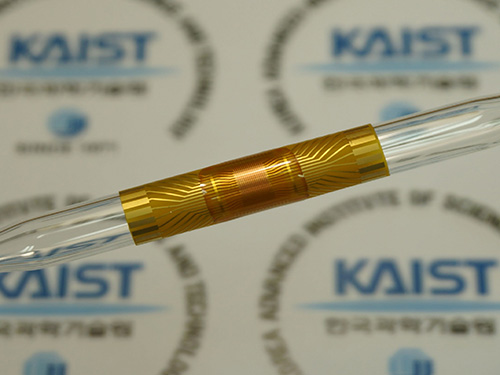 Continuous Roll-Process Technology for Transferring and Packaging Flexible Large-Scale Integrated Circuits
A research team led by Professor Keon Jae Lee from KAIST and by Dr. Jae-Hyun Kim from the Korea Institute of Machinery and Materials (KIMM) has jointly developed a continuous roll-processing technology that transfers and packages flexible large-scale integrated circuits (LSI), the key element in constructing the computer’s brain such as CPU, on plastics to realize flexible electronics.
Professor Lee previously demonstrated the silicon-based flexible LSIs using 0.18 CMOS (complementary metal-oxide semiconductor) process in 2013 (ACS Nano, “In Vivo Silicon-based Flexible Radio Frequency Integrated Circuits Monolithically Encapsulated with Biocompatible Liquid Crystal Polymers”) and presented the work in an invited talk of 2015 International Electron Device Meeting (IEDM), the world’s premier semiconductor forum.
Highly productive roll-processing is considered a core technology for accelerating the commercialization of wearable computers using flexible LSI. However, realizing it has been a difficult challenge not only from the roll-based manufacturing perspective but also for creating roll-based packaging for the interconnection of flexible LSI with flexible displays, batteries, and other peripheral devices.
To overcome these challenges, the research team started fabricating NAND flash memories on a silicon wafer using conventional semiconductor processes, and then removed a sacrificial wafer leaving a top hundreds-nanometer-thick circuit layer. Next, they simultaneously transferred and interconnected the ultrathin device on a flexible substrate through the continuous roll-packaging technology using anisotropic conductive film (ACF). The final silicon-based flexible NAND memory successfully demonstrated stable memory operations and interconnections even under severe bending conditions. This roll-based flexible LSI technology can be potentially utilized to produce flexible application processors (AP), high-density memories, and high-speed communication devices for mass manufacture.
Professor Lee said, “Highly productive roll-process was successfully applied to flexible LSIs to continuously transfer and interconnect them onto plastics. For example, we have confirmed the reliable operation of our flexible NAND memory at the circuit level by programming and reading letters in ASCII codes. Out results may open up new opportunities to integrate silicon-based flexible LSIs on plastics with the ACF packing for roll-based manufacturing.”
Dr. Kim added, “We employed the roll-to-plate ACF packaging, which showed outstanding bonding capability for continuous roll-based transfer and excellent flexibility of interconnecting core and peripheral devices. This can be a key process to the new era of flexible computers combining the already developed flexible displays and batteries.”
The team’s results will be published on the front cover of Advanced Materials (August 31, 2016) in an article entitled “Simultaneous Roll Transfer and Interconnection of Silicon NAND Flash Memory.” (DOI: 10.1002/adma.201602339)
YouTube Link: https://www.youtube.com/watch?v=8OJjAEm27sw
Picture 1: This schematic image shows the flexible silicon NAND flash memory produced by the simultaneous roll-transfer and interconnection process.
Picture 2: The flexible silicon NAND flash memory is attached to a 7 mm diameter glass rod.
2016.09.01 View 13475
Continuous Roll-Process Technology for Transferring and Packaging Flexible Large-Scale Integrated Circuits
A research team led by Professor Keon Jae Lee from KAIST and by Dr. Jae-Hyun Kim from the Korea Institute of Machinery and Materials (KIMM) has jointly developed a continuous roll-processing technology that transfers and packages flexible large-scale integrated circuits (LSI), the key element in constructing the computer’s brain such as CPU, on plastics to realize flexible electronics.
Professor Lee previously demonstrated the silicon-based flexible LSIs using 0.18 CMOS (complementary metal-oxide semiconductor) process in 2013 (ACS Nano, “In Vivo Silicon-based Flexible Radio Frequency Integrated Circuits Monolithically Encapsulated with Biocompatible Liquid Crystal Polymers”) and presented the work in an invited talk of 2015 International Electron Device Meeting (IEDM), the world’s premier semiconductor forum.
Highly productive roll-processing is considered a core technology for accelerating the commercialization of wearable computers using flexible LSI. However, realizing it has been a difficult challenge not only from the roll-based manufacturing perspective but also for creating roll-based packaging for the interconnection of flexible LSI with flexible displays, batteries, and other peripheral devices.
To overcome these challenges, the research team started fabricating NAND flash memories on a silicon wafer using conventional semiconductor processes, and then removed a sacrificial wafer leaving a top hundreds-nanometer-thick circuit layer. Next, they simultaneously transferred and interconnected the ultrathin device on a flexible substrate through the continuous roll-packaging technology using anisotropic conductive film (ACF). The final silicon-based flexible NAND memory successfully demonstrated stable memory operations and interconnections even under severe bending conditions. This roll-based flexible LSI technology can be potentially utilized to produce flexible application processors (AP), high-density memories, and high-speed communication devices for mass manufacture.
Professor Lee said, “Highly productive roll-process was successfully applied to flexible LSIs to continuously transfer and interconnect them onto plastics. For example, we have confirmed the reliable operation of our flexible NAND memory at the circuit level by programming and reading letters in ASCII codes. Out results may open up new opportunities to integrate silicon-based flexible LSIs on plastics with the ACF packing for roll-based manufacturing.”
Dr. Kim added, “We employed the roll-to-plate ACF packaging, which showed outstanding bonding capability for continuous roll-based transfer and excellent flexibility of interconnecting core and peripheral devices. This can be a key process to the new era of flexible computers combining the already developed flexible displays and batteries.”
The team’s results will be published on the front cover of Advanced Materials (August 31, 2016) in an article entitled “Simultaneous Roll Transfer and Interconnection of Silicon NAND Flash Memory.” (DOI: 10.1002/adma.201602339)
YouTube Link: https://www.youtube.com/watch?v=8OJjAEm27sw
Picture 1: This schematic image shows the flexible silicon NAND flash memory produced by the simultaneous roll-transfer and interconnection process.
Picture 2: The flexible silicon NAND flash memory is attached to a 7 mm diameter glass rod.
2016.09.01 View 13475 -
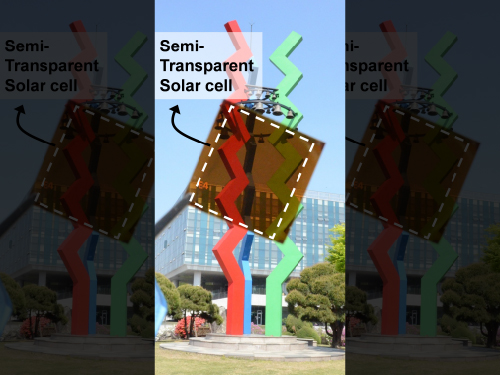 KAIST Team Develops Semi-Transparent Solar Cells with Thermal Mirror Capability
A research team led by KAIST and Sungkyunkwan University professors has created semi-transparent perovskite solar cells that demonstrate high-power conversion efficiency and transmit visible light while blocking infrared light, making them great candidates for solar windows.
Modern architects prefer to build exteriors designed with glass mainly from artistic or cost perspectives. Scientists, however, go one step further and see opportunities from its potential ability to harness solar energy. Researchers have thus explored ways to make solar cells transparent or semi-transparent as a substitute material for glass, but this has proven to be a challenging task because solar cells need to absorb sunlight to generate electricity, and when they are transparent, it reduces their energy efficiency.
Typical solar cells today are made of crystalline silicon, but it is difficult to make them translucent. Semi-transparent solar cells under development use, for example, organic or dye-sensitized materials, but compared to crystalline silicon-based cells, their power-conversion efficiencies are relatively low. Perovskites are hybrid organic-inorganic halide-based photovoltaic materials, which are cheap to produce and easy to manufacture. They have recently received much attention as the efficiency of perovskite solar cells has rapidly increased to the level of silicon technologies in the past few years.
Using perovskites, a Korean research team led by Professor Seunghyup Yoo of the Electrical Engineering School at KAIST and Professor Nam-Gyu Park of the Chemical Engineering School at Sungkyunkwan University developed a semi-transparent solar cell that is highly efficient and, additionally, functions very effectively as a thermal-mirror.
The team has developed a top transparent electrode (TTE) that works well with perovskite solar cells. In most cases, a key to success in realizing semi-transparent solar cells is to find a TTE that is compatible with a given photoactive material system, which is also the case for perovskite solar cells. The proposed TTE is based on a multilayer stack consisting of a metal film sandwiched between a high refractive-index (high-index) layer and an interfacial buffer layer. This TTE, placed as a top-most layer, can be prepared without damaging ingredients used in perovskite solar cells. Unlike conventional transparent electrodes focusing only on transmitting visible light, the proposed TTE plays the dual role of passing through visible light while reflecting infrared rays. The semi-transparent solar cells made with the proposed TTEs exhibited average power conversion efficiency as high as 13.3% with 85.5% infrared rejection.
The team believes that if the semi-transparent perovskite solar cells are scaled up for practical applications, they can be used in solar windows for buildings and automobiles, which not only generate electrical energy but also enable the smart heat management for indoor environments, thereby utilizing solar energy more efficiently and effectively.
This result was published as a cover article in the July 20, 2016 issue of Advanced Energy Materials. The research paper is entitled “Empowering Semi-transparent Solar Cells with Thermal-mirror Functionality.” (DOI: 10.1002/aenm.201502466)
The team designed the transparent electrode (TE) stack in three layers: A thin-film of silver (Ag) is placed in between the bottom interfacial layer of molybdenum trioxide (MoO3) and the top high-index dielectric layer of zinc sulfide (ZnS). Such a tri-layer approach has been known as a means to increase the overall visible-light transmittance of metallic thin films via index matching technique, which is essentially the same technique used for anti-reflection coating of glasses except that the present case involves a metallic layer.
Traditionally, when a TE is based on a metal film, such as Ag, the film should be extremely thin, e.g., 7-12 nanometers (nm), to obtain transparency and, accordingly, to transmit visible light. However, the team took a different approach in this research. They made the Ag TE two or three times thicker (12-24 nm) than conventional metal films and, as a result, it reflected more infrared light. The high refractive index of the ZnS layer plays an essential role in keeping the visible light transmittance of the proposed TTE high even with the relatively thick Ag film when its thickness is carefully optimized for maximal destructive interference, leading to low reflectance (and thus high transmittance) within its visible light range.
The team confirmed the semi-transparent perovskite solar cell’s thermal-mirror function through an experiment in which a halogen lamp illuminated an object for five minutes through three mediums: a window of bare glass, automotive tinting film, and the proposed semi-transparent perovskite solar cell. An infrared (IR) camera took thermal images of the object as well as that of each window’s surface. The object’s temperature, when exposed through the glass window, rose to 36.8 Celsius degrees whereas both the tinting film and the cell allowed the object to remain below 27 Celsius degrees. The tinting film absorbs light to block solar energy, so the film’s surface became hot as it was continuously exposed to the lamp light, but the proposed semi-transparent solar cell stayed cool since it rejects solar heat energy by reflection, rather than by absorption. The total solar energy rejection (TSER) of the proposed cell was as high as 89.6%.
Professor Yoo of KAIST said, “The major contributions of this work are to find transparent electrode technology suitable for translucent perovskite cells and to provide a design approach to fully harness the potential it can further deliver as a heat mirror in addition to its main role as an electrode. The present work can be further fine-tuned to include colored solar cells and to incorporate flexible or rollable form factors, as they will allow for greater design freedom and thus offer more opportunities for them to be integrated into real-world objects and structures such as cars, buildings, and houses.”
The lead authors are Hoyeon Kim and Jaewon Ha, both Ph.D. candidates in the School of Electrical Engineering at KAIST, and Hui-Seon Kim, a student in the School of Chemical Engineering at Sungkyunkwan University. This research was supported mainly by the Climate Change Research Hub Program of KAIST.
Picture 1: Semi-transparent Perovskite Solar Cell
This picture shows a prototype of a semi-transparent perovskite solar cell with thermal-mirror functionality.
Picture 2: A Heat Rejection Performance Comparison Experiment
This picture presents thermal images taken by an infrared camera for comparing the heat rejection performance of bare glass, automotive tinting film, and a semi-transparent perovskite solar cell after being illuminated by a halogen lamp for five minutes.
2016.08.02 View 14064
KAIST Team Develops Semi-Transparent Solar Cells with Thermal Mirror Capability
A research team led by KAIST and Sungkyunkwan University professors has created semi-transparent perovskite solar cells that demonstrate high-power conversion efficiency and transmit visible light while blocking infrared light, making them great candidates for solar windows.
Modern architects prefer to build exteriors designed with glass mainly from artistic or cost perspectives. Scientists, however, go one step further and see opportunities from its potential ability to harness solar energy. Researchers have thus explored ways to make solar cells transparent or semi-transparent as a substitute material for glass, but this has proven to be a challenging task because solar cells need to absorb sunlight to generate electricity, and when they are transparent, it reduces their energy efficiency.
Typical solar cells today are made of crystalline silicon, but it is difficult to make them translucent. Semi-transparent solar cells under development use, for example, organic or dye-sensitized materials, but compared to crystalline silicon-based cells, their power-conversion efficiencies are relatively low. Perovskites are hybrid organic-inorganic halide-based photovoltaic materials, which are cheap to produce and easy to manufacture. They have recently received much attention as the efficiency of perovskite solar cells has rapidly increased to the level of silicon technologies in the past few years.
Using perovskites, a Korean research team led by Professor Seunghyup Yoo of the Electrical Engineering School at KAIST and Professor Nam-Gyu Park of the Chemical Engineering School at Sungkyunkwan University developed a semi-transparent solar cell that is highly efficient and, additionally, functions very effectively as a thermal-mirror.
The team has developed a top transparent electrode (TTE) that works well with perovskite solar cells. In most cases, a key to success in realizing semi-transparent solar cells is to find a TTE that is compatible with a given photoactive material system, which is also the case for perovskite solar cells. The proposed TTE is based on a multilayer stack consisting of a metal film sandwiched between a high refractive-index (high-index) layer and an interfacial buffer layer. This TTE, placed as a top-most layer, can be prepared without damaging ingredients used in perovskite solar cells. Unlike conventional transparent electrodes focusing only on transmitting visible light, the proposed TTE plays the dual role of passing through visible light while reflecting infrared rays. The semi-transparent solar cells made with the proposed TTEs exhibited average power conversion efficiency as high as 13.3% with 85.5% infrared rejection.
The team believes that if the semi-transparent perovskite solar cells are scaled up for practical applications, they can be used in solar windows for buildings and automobiles, which not only generate electrical energy but also enable the smart heat management for indoor environments, thereby utilizing solar energy more efficiently and effectively.
This result was published as a cover article in the July 20, 2016 issue of Advanced Energy Materials. The research paper is entitled “Empowering Semi-transparent Solar Cells with Thermal-mirror Functionality.” (DOI: 10.1002/aenm.201502466)
The team designed the transparent electrode (TE) stack in three layers: A thin-film of silver (Ag) is placed in between the bottom interfacial layer of molybdenum trioxide (MoO3) and the top high-index dielectric layer of zinc sulfide (ZnS). Such a tri-layer approach has been known as a means to increase the overall visible-light transmittance of metallic thin films via index matching technique, which is essentially the same technique used for anti-reflection coating of glasses except that the present case involves a metallic layer.
Traditionally, when a TE is based on a metal film, such as Ag, the film should be extremely thin, e.g., 7-12 nanometers (nm), to obtain transparency and, accordingly, to transmit visible light. However, the team took a different approach in this research. They made the Ag TE two or three times thicker (12-24 nm) than conventional metal films and, as a result, it reflected more infrared light. The high refractive index of the ZnS layer plays an essential role in keeping the visible light transmittance of the proposed TTE high even with the relatively thick Ag film when its thickness is carefully optimized for maximal destructive interference, leading to low reflectance (and thus high transmittance) within its visible light range.
The team confirmed the semi-transparent perovskite solar cell’s thermal-mirror function through an experiment in which a halogen lamp illuminated an object for five minutes through three mediums: a window of bare glass, automotive tinting film, and the proposed semi-transparent perovskite solar cell. An infrared (IR) camera took thermal images of the object as well as that of each window’s surface. The object’s temperature, when exposed through the glass window, rose to 36.8 Celsius degrees whereas both the tinting film and the cell allowed the object to remain below 27 Celsius degrees. The tinting film absorbs light to block solar energy, so the film’s surface became hot as it was continuously exposed to the lamp light, but the proposed semi-transparent solar cell stayed cool since it rejects solar heat energy by reflection, rather than by absorption. The total solar energy rejection (TSER) of the proposed cell was as high as 89.6%.
Professor Yoo of KAIST said, “The major contributions of this work are to find transparent electrode technology suitable for translucent perovskite cells and to provide a design approach to fully harness the potential it can further deliver as a heat mirror in addition to its main role as an electrode. The present work can be further fine-tuned to include colored solar cells and to incorporate flexible or rollable form factors, as they will allow for greater design freedom and thus offer more opportunities for them to be integrated into real-world objects and structures such as cars, buildings, and houses.”
The lead authors are Hoyeon Kim and Jaewon Ha, both Ph.D. candidates in the School of Electrical Engineering at KAIST, and Hui-Seon Kim, a student in the School of Chemical Engineering at Sungkyunkwan University. This research was supported mainly by the Climate Change Research Hub Program of KAIST.
Picture 1: Semi-transparent Perovskite Solar Cell
This picture shows a prototype of a semi-transparent perovskite solar cell with thermal-mirror functionality.
Picture 2: A Heat Rejection Performance Comparison Experiment
This picture presents thermal images taken by an infrared camera for comparing the heat rejection performance of bare glass, automotive tinting film, and a semi-transparent perovskite solar cell after being illuminated by a halogen lamp for five minutes.
2016.08.02 View 14064 -
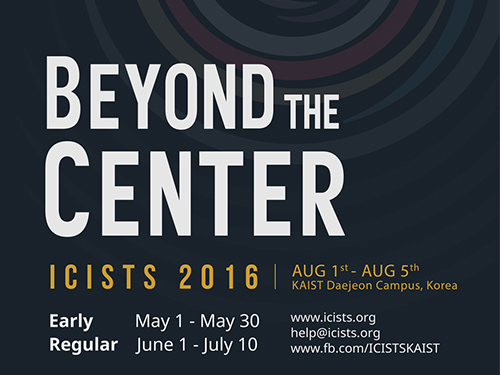 ICISTS Hosts the International Interdisciplinary Conference
A KAIST student organization, The International Conference for the Integration of Science, Technology and Society (ICISTS), will host ICISTS 2016 at the Hotel ICC in Daejeon from 3 to 7 August with the participation of around 300 Korean and international students.
ICISTS was first established in 2005 to provide an annual platform for delegates and speakers to discuss the integration and the convergence of science, technology, and society regardless of their academic backgrounds.
This year’s conference, with the theme of “Beyond the Center,” emphasizes the ways in which technological advancements can change central organizations in areas such as financial technology, healthcare, and global governance.
The keynote speakers include Dennis Hong, a developer of the first automobile for the blind and a professor of the Mechanical and Aerospace Engineering Department at UCLA, Dor Konforty, a founder and a CEO of SNS platform Synereo, and Marzena Rostek, a professor of Economics at the University of Wisconsin-Madison.
Other notable speakers include: Gi-Jung Jung, Head of the National Fusion Research Institute; Janos Barberis, Founder of FinTech HK; Tae-Hoon Kim, CEO and Founder of Rainist; Gulrez Shah Azhar, Assistant Policy Analyst at RAND Corporation; Thomas Concannon, Senior Policy Researcher at RAND Corporation; Leah Vriesman, Professor at the School of Public Health, UCLA; and Bjorn Cumps, Professor of Management Practice at Vlerick Business School in Belgium.
The conference consists of keynote speeches, panel discussions, open talks, experience sessions, team project presentations, a culture night, and a beer party, at which all participants will be encouraged to interact with speakers and delegates and to discuss the topics of their interest.
Han-Kyul Jung, ICISTS’s Head of Public Relations, said, “This conference will not only allow the delegates to understand the trends of future technology, but also be an opportunity for KAIST students to form valuable contacts with students from around the world.”
For more information, please go to www.icists.org.
2016.07.20 View 10105
ICISTS Hosts the International Interdisciplinary Conference
A KAIST student organization, The International Conference for the Integration of Science, Technology and Society (ICISTS), will host ICISTS 2016 at the Hotel ICC in Daejeon from 3 to 7 August with the participation of around 300 Korean and international students.
ICISTS was first established in 2005 to provide an annual platform for delegates and speakers to discuss the integration and the convergence of science, technology, and society regardless of their academic backgrounds.
This year’s conference, with the theme of “Beyond the Center,” emphasizes the ways in which technological advancements can change central organizations in areas such as financial technology, healthcare, and global governance.
The keynote speakers include Dennis Hong, a developer of the first automobile for the blind and a professor of the Mechanical and Aerospace Engineering Department at UCLA, Dor Konforty, a founder and a CEO of SNS platform Synereo, and Marzena Rostek, a professor of Economics at the University of Wisconsin-Madison.
Other notable speakers include: Gi-Jung Jung, Head of the National Fusion Research Institute; Janos Barberis, Founder of FinTech HK; Tae-Hoon Kim, CEO and Founder of Rainist; Gulrez Shah Azhar, Assistant Policy Analyst at RAND Corporation; Thomas Concannon, Senior Policy Researcher at RAND Corporation; Leah Vriesman, Professor at the School of Public Health, UCLA; and Bjorn Cumps, Professor of Management Practice at Vlerick Business School in Belgium.
The conference consists of keynote speeches, panel discussions, open talks, experience sessions, team project presentations, a culture night, and a beer party, at which all participants will be encouraged to interact with speakers and delegates and to discuss the topics of their interest.
Han-Kyul Jung, ICISTS’s Head of Public Relations, said, “This conference will not only allow the delegates to understand the trends of future technology, but also be an opportunity for KAIST students to form valuable contacts with students from around the world.”
For more information, please go to www.icists.org.
2016.07.20 View 10105 -
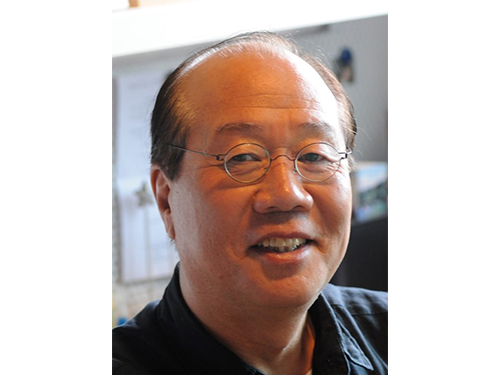 Professor Kun-pyo Lee Appointed Honorary Fellow of the Design Research Society
Founded in the United Kingdom (UK) in 1966, the Design Research Society is an international academic organization that promotes excellence in design and supports the interests of the design research community.
Professor Kun-pyo Lee of the Industrial Design Department at KAIST received his honorary fellowship from the Society at its 50th international conference held from June 27, 2016 to July 3, 2016 in Brighton, UK.
The Society recognized Professor Lee’s academic achievements and his contribution to the advancement of design research nationally and globally. To date, only eight researchers have received honorary fellowships from the Society, and he is the first Asian to become an honorary fellow.
Professor Lee has worked at KAIST for more than 30 years as a professor in industrial engineering and served on various important positions such as the president of the Korean Society of Design Science, the president of the International Association of Societies of Design Research, an executive vice president of the Corporate Design Center at LG Electronics, and an advisory board member for Human-centered Design Network in Japan and UXnet in the United States.
By introducing the concept of user experience (UX) in Korea for the first time, he developed this field while focusing on user-centered designs to optimize interactive digital products as well as interaction design to create mental and physical interfaces between people and interactive digital products, services, and systems.
Professor Lee said, “I am pleased to become an honorary fellow of the Design Research Society. For quiet some time, industrial design remained in the domain of practical studies, lacking the kind of support needed to grow as an independent academic and research discipline, but this has changed rapidly in recent years. I will continue to remain actively involved in the development of industrial design engineering in Korea and the world.”
2016.07.19 View 9913
Professor Kun-pyo Lee Appointed Honorary Fellow of the Design Research Society
Founded in the United Kingdom (UK) in 1966, the Design Research Society is an international academic organization that promotes excellence in design and supports the interests of the design research community.
Professor Kun-pyo Lee of the Industrial Design Department at KAIST received his honorary fellowship from the Society at its 50th international conference held from June 27, 2016 to July 3, 2016 in Brighton, UK.
The Society recognized Professor Lee’s academic achievements and his contribution to the advancement of design research nationally and globally. To date, only eight researchers have received honorary fellowships from the Society, and he is the first Asian to become an honorary fellow.
Professor Lee has worked at KAIST for more than 30 years as a professor in industrial engineering and served on various important positions such as the president of the Korean Society of Design Science, the president of the International Association of Societies of Design Research, an executive vice president of the Corporate Design Center at LG Electronics, and an advisory board member for Human-centered Design Network in Japan and UXnet in the United States.
By introducing the concept of user experience (UX) in Korea for the first time, he developed this field while focusing on user-centered designs to optimize interactive digital products as well as interaction design to create mental and physical interfaces between people and interactive digital products, services, and systems.
Professor Lee said, “I am pleased to become an honorary fellow of the Design Research Society. For quiet some time, industrial design remained in the domain of practical studies, lacking the kind of support needed to grow as an independent academic and research discipline, but this has changed rapidly in recent years. I will continue to remain actively involved in the development of industrial design engineering in Korea and the world.”
2016.07.19 View 9913